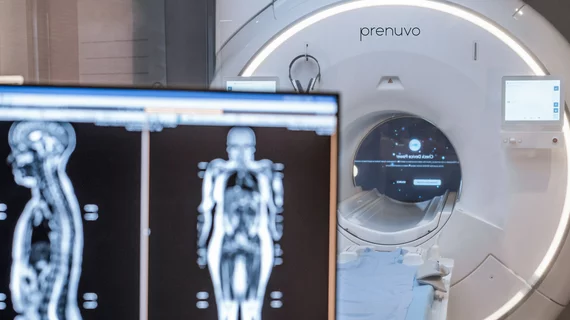Cindy Crawford-backed startup Prenuvo launches clinical trial to assess impact of whole-body MRI
Prenuvo—an imaging startup backed by Cindy Crawford and other celebrities—is launching a clinical trial to explore the benefits of whole-body MRI exams, leaders announced June 27.
Led by radiologist Yosef “Sefi” Chodakiewitz, MD, Project Hercules aims to enroll 100,000 adults, with a focus on medically underserved populations. Chodakiewitz and colleagues hope up to half (and at least 10%) of participants meet health equity qualifications, with the company subsidizing participation costs among this group.
The project will span 10 years and operate out of the Hercules Research Center in Watertown, Massachusetts, which specializes in these exams.
“There is an unmet health system need to enable detection of early-stage disease processes before they become irreversible chronic or progressive clinical disease states, when gentler, less invasive and less costly interventions (or even sometimes risk factor management) are more likely to have a chance at preventing or reversing the course of the disease,” Chodakiewitz said in an announcement. “Through the unique Prenuvo-sponsored scientific study at the Hercules Research Center, we hope to demonstrate how early detection through [whole body] MRI can fundamentally change the way we approach health and disease.”
Only about 14% of cancers are diagnosed through recommended “gold standard” screening tests, Prenuvo noted. This results in radiologists unearthing cases in which symptoms have already arisen, and the prognosis has potentially worsened. Prenuvo hopes that its whole-body exam—which costs about $2,500 and lasts 60 minutes—will help to catch cases earlier.
Chodakiewitz and colleagues believe this is the largest study of its kind on whole-body MRI. The company plans to subsidize 50% to 100% of participation costs for individuals meeting certain requirements. This includes being a SNAP (Supplemental Nutrition Assistance Program) user, with Prenuvo hoping to ensure broad participation among medically underserved populations.
“By investing in the largest clinical study of the effectiveness of clinical-grade MRI screening ever conducted, Prenuvo’s goal is to pave the way for such technology to be standard of care and available to all,” CEO Andrew Lacy told Longevity Technology news. “Doing so will lead to longevity improvements that are measured in years for all and produce a leaner health system focused on proactive rather than reactive medicine.”
The company and its services have drawn considerable interest, raising $70 million from investors including Cindy Crawford and 23AndMe CEO Anne Wojcicki. Prenuvo previously announced ambitious expansion plans, with the firm currently operating locations across New York, Los Angeles, Redwood City, Calif., Dallas, Boca Raton, Fla., Chicago, Bethesda, Md., Atlanta, Vancouver, and a partner location in Minneapolis.
Others such as radiology practice SimonMed and startup Ezra also have sought to capitalize on the burgeoning whole-body MRI market. However, some have criticized the business model, concerned the exams could lead to additional tests and procedures for findings that have little to no clinical significance.

